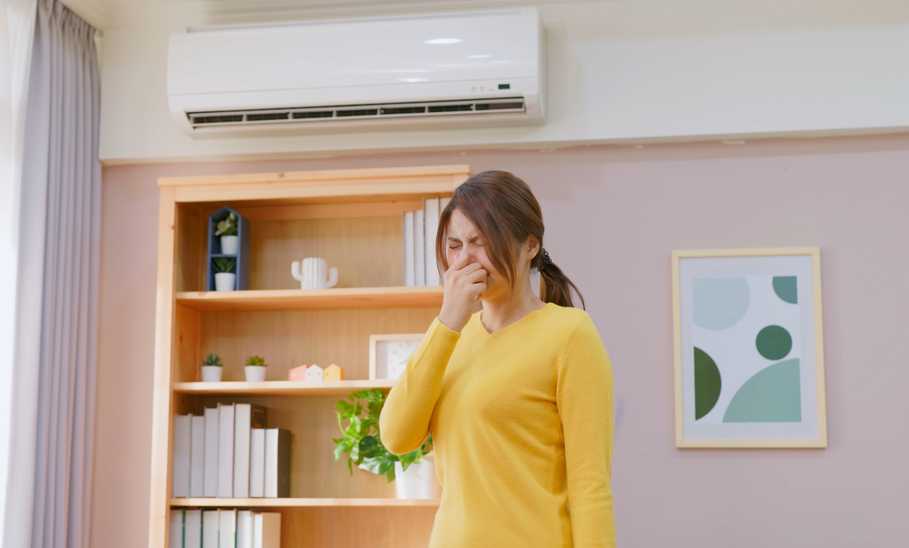Why Does My Air Conditioner Smell? A Brief Guide to AC Maintenance


Our evaluations and opinions are not influenced by our advertising relationships, but we may earn a commission from our partners’ links. This content is created by TIME Stamped, under TIME’s direction and produced in accordance with TIME’s editorial guidelines and overseen by TIME’s editorial staff. Learn more about it.
Nothing is worse than starting up your air conditioner on a hot day, only to be hit with a terrible smell blowing out of the vents. A strange, noxious odor is a common indicator that your AC unit is experiencing a problem, and while some are quick fixes that you can easily do yourself, other smell-related issues are potentially dangerous and require a qualified AC technician to fix right away. It’s better to be safe than sorry, so I spoke with AC experts to list the most common smells associated with air conditioner difficulties as well as the best techniques to handle them:
Easily the most preventable odor-related AC issues stem from neglecting to change the air filter regularly. A dirty air filter may cause your AC to spread a musty, moldy, and dusty odor throughout your home. In addition, an especially filthy air filter may restrict your AC unit’s air flow, causing it to overheat and emit a nasty smell as well, so be sure to swap out your air filter at least once every 90 days.
“If someone called in about an unusual AC smell, the first step would be to replace the air filter,” notes Daniel Berry, HVAC-R Program Director at Fortis Institute in Scranton, Pa. So, if the homeowner has not changed the filter in some time, this might be an easy fix. The filters remove all types of particulate materials that are pulled through the system, and there could be many items causing the system to smell.
“I once received a call about odors coming from a unit, and it turned out to be the smell of some plants that the owner had received as a gift. The smell of the plants was circulating throughout the house and, when mixed with other materials, was producing an unpleasant smell.” recalled Berry. “Surprisingly, I have seen items in a house that produce a smell that can be picked up and moved through the system.” Filters can be a big help with these types of issues, so be sure and change regularly.
The pungent smell of fungus, mildew, and mold indicates your AC unit is a hotbed for bacteria and fungus growth. This can happen for a number of reasons, including not using your system for an extended period, too much moisture, poor ventilation, and a full drip pan.
The first step to undo a moldy smell is to replace its air filter and empty the system’s drip pan. But if the musty-mold smell persists, you may need to call a professional to find the source of the moisture and eliminate the fungal infestation before it becomes a bigger problem.
If you notice a subtle, sweet scent whenever you run the AC, there is a good chance your system is leaking refrigerant. A freon leak in your home is a dangerous situation, as this substance is both flammable and harmful if inhaled. If you suspect your AC is leaking freon, open all your windows, remove pets from the area, and call an air conditioning technician immediately.
Several odors can be attributed to an air conditioner’s evaporator coils (which absorb the heat from the air inside your home) including moldy, smoky, musty, and generally gross smells. If you haven’t used your AC in a while, bacteria or mold may have grown inside the evaporator coils. If the smell doesn’t go away after swapping out your AC filter, you may need to have them professionally cleaned.
If you smoke indoors, the AC’s evaporator coils are likely to retain the smell and spread it throughout your home. A combination of replacing the air filter with a premium model to trap and remove smoking odors from the system and refraining from smoking inside should remove the odor in time.
Frozen evaporator coils are likely to spread an unpleasant musty smell throughout your home. Signs that your AC’s evaporator coils are frozen include a full or overflowing drip pan, a lot of noticeable moisture around your indoor unit, and ice crystals on the coils themselves. You will need to call a professional to have your unit repaired if the coils have frozen over.
A rotten or nasty smell emanating from the AC vents may indicate the evaporator coils have become contaminated with mold or bacteria. If replacing the unit’s air filter doesn’t clear up the problem quickly, you may need to have the system professionally cleaned.
If your AC’s condensate drain line is clogged, it can result in a moldy or sewage-like odor to seep into your home. Use a wet-vacuum cleaner or run a snake down the line to unclog the drain and empty its drain pan to remove the excess moisture and awful smell.
If you ever notice a burning or smoke-like scent when you run the AC, turn the unit off immediately. The burning smell is likely due to an electrical failure, (frayed wiring, compressor, fan, etc.), and it’s critical to drop everything and call a professional for urgent repairs.
If your AC gives off an awful rotten odor, it could be because an animal may have crawled into your unit and died. Whether it’s a squirrel, rat, bird, or some other pest, you’ll have to remove it to get rid of the offending smell; if you are lucky and it is close to an accessible vent, you may be able to reach the remains, otherwise you may need to hire someone to remove it from the depths of your home’s ductwork. “Bottom line, unusual smells or noises are a sure sign you need to call in professional help right away." says Berry.
The odor of gunpowder or a distinct burning smell indicates a dangerous electrical issue. Turn off the AC system and call a professional for immediate repairs.
The pungent smell of mildew like an uncleaned shower implies that the AC is contaminated with fungus, mold, mildew, and/or bacteria. Changing the air filter is the best course of action to remove the smell from your system.
“Like any other drain, this system could become blocked,” Berry notes. If it does, the water will lay in the AC unit and often can become stagnant. This stagnant water could form mold, which is most dangerous to the homeowner and needs to be addressed by a professional. “For example, I once had a blocked drain that was so full of mold that when I accessed the drain pan, it looked like it was full of black cottage cheese. It was a most unpleasant experience”
An unusual sweet aroma or a strange chemical odor points to a refrigerant leak. Turn off the AC, open the windows, and call a professional to repair the system right away.
The putrid smell of rotten eggs or decay coming from your AC vents is usually due to a dead animal somewhere in the ductwork. You’ll need to remove and clean the affected area to get rid of the nasty aroma.
You may have noticed a recurring theme, but replacing your AC’s air filter should be your go-to solution to eliminate offending odors coming from the vents. Consider investing in a premium filter that can remove small particles from the air, such as a HEPA filter or an activated carbon filter. These filters are adept at removing odd smells, hair, dust, dander, pollen, and other pollutants out of the air.
“I would recommend that homeowners change filters often and if the smell does not go away within a day or so, they should engage the services of an HVAC professional immediately," says Berry. He also recommends keeping an ear open for odd sounds that could be an early sign of a dirty filter.
Moldy, mildew, and sewer-like smells coming from your AC may be solved by unclogging its drain line. You can either thread a snake through this drain pipe or remove a clog with a wet vacuum, and be sure to empty its drip pan as well. “If your unit smells, it needs to be cleaned out right away. A smell could be mold, and that is a health hazard for sure. A smell could be likely caused by a blocked drain, a reasonably easy fix but a hidden danger. The most common cause of this smell is usually a blocked drain,” warns Berry.
Knowing how to clean an air conditioner can help prevent smells and extend the lifespan of your unit or system. To do: regularly dust air vents to improve ventilation and air quality. Also, vacuum evaporator coils once a year—with the system safely turned off. And be sure to schedule yearly professional HVAC (Heating, Ventilation, and Air Conditioning) maintenance— with someone who knows how to work with all types of air conditioner brands—to help prevent smells from cropping up in the first place.
Air purifiers actively filter particles from the air around it, including those that cause gross odors, making them an excellent supplementary tool to help clean your air — especially as you are investigating the source of your AC’s foul smell.
Although deodorizers such as scented candles, wall plug-ins, air freshening sprays, potpourri, and incense may help to temporarily mask a smell caused by an AC-related problem, they will not neutralize the offending odor. Deodorizers like these should only be used to freshen your space while dealing with the actual problem.
If you suspect your AC unit is leaking refrigerant gasses into your home or detect a gunpowder or general burning odor, turn off the system and contact a professional HVAC repair company right away.
If you need to take a closer look at your air conditioner, power down the system for your safety in case there’s an unseen electrical issue.
Use the above guide to determine the best course of action based on your AC’s odor.
If you can’t detect the exact source of the smell or the job is too difficult or unwieldy for you to fix on your own, do yourself a favor and call a HVAC professional to save you time and money.
Keep in mind that you may need a new air conditioner if your system is over 12 to 15 years old, needs to be repaired often, it is particularly noisy, or if you notice your energy bills steadily rising more than usual after running the AC. “Depending on where you live, your unit should be maintained once a year in the Northern part of the U.S. and twice a year in the South,” advises Berry. While new air conditioners are expensive, chances are good that this investment will save you money in the long run and keep you cooler for less money throughout the warmer months.

The information presented here is created by TIME Stamped and overseen by TIME editorial staff. To learn more, see our About Us page.



